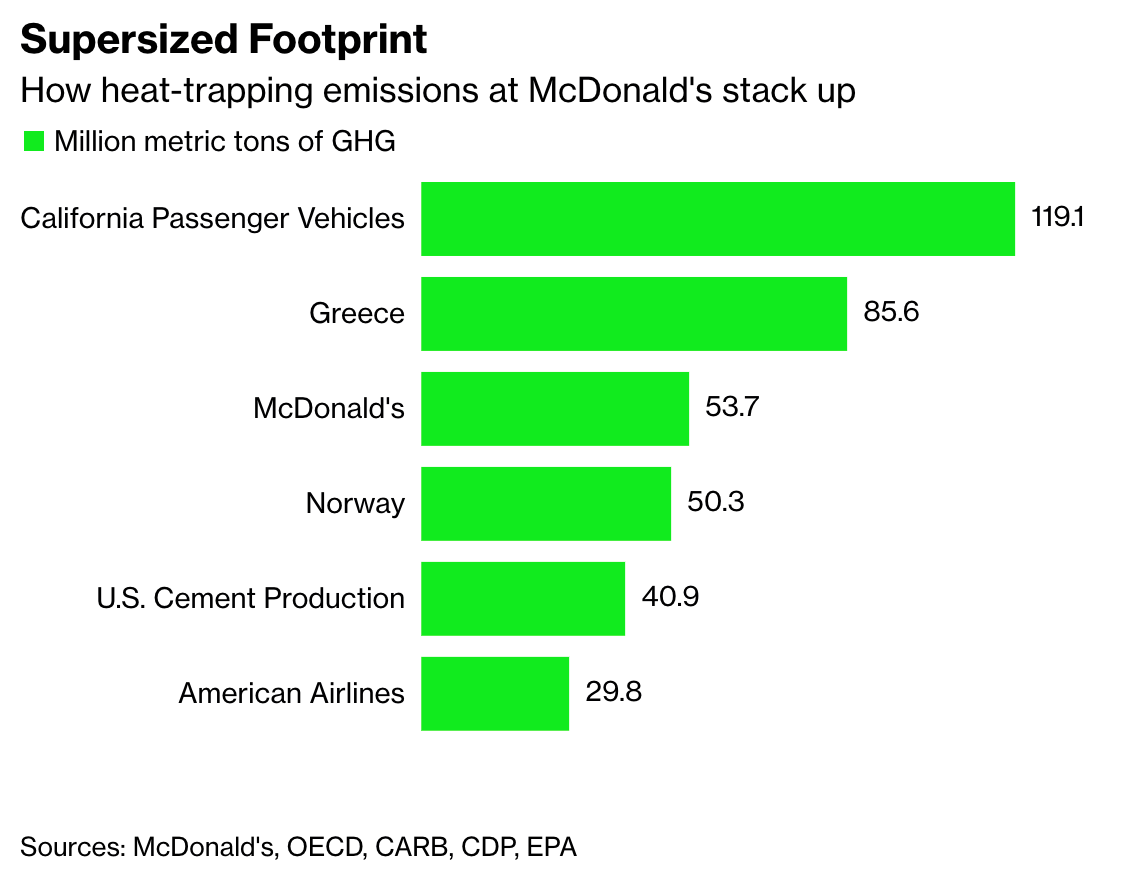In today’s edition:
⚡️ Tesla opens up its chargers
🌿 Amazon’s seaweed farm
🚜 Cost-effective farming plots in Mumbai
Forwarded on this email by a friend?
📩 Submit deals, announcements, events & opportunities, or general curiosities for the newsletter here.
💼 Big Business (1-minute read)
McDonald's to power U.S. supply chain with solar energy
Mcdonald's and its suppliers have signed a deal with a solar farm near Texas for the supply of 190 megawatts of renewable energy (enough to run around 38,000 Texan homes), which will power all the warehouses, distribution centres and other elements of the logistics supply chain that serves Mcdonalds’ US restaurants. The deal is the first time a corporation has served as an anchor buyer for an aggregation deal for its suppliers — meaning McDonald’s is shouldering lots of the legal and contractual aspects of the agreement while streamlining the purchase of renewables for its suppliers.
Critique: The deal represents a relatively small part of McDonald’s supply chain emissions as the operation of restaurant franchisees represents less than 15% of supply chain emissions, with the majority coming from purchasing goods such as beef, cheese and pork.

Tesla to open up its charging network to other electric vehicles (EVs)
The Tesla charging network, the largest in the US, has (until now) been available to Tesla drivers only. However, the Whitehouse has confirmed that the company will allow all EVs to use at least 7,500 chargers and superchargers across its network by 2024. Expanding the country’s EV charging network is a key part of the Biden administration’s push for 50% of US vehicle sales to be electric by 2030, with the aim of having 500,000 chargers across the country by 2030 (there are currently 130,000 public chargers nationwide).
In it for Tesla: Higher utilisation of their chargers, quicker payback time for chargers and the potential to force other charging competitors out of the market.
Amazon grants €1.5m for first-of-its-kind seaweed farm
The online retail giant will support the creation of a 10-hectare seaweed farm located in the empty space between turbines on a wind farm off the coast of the Netherlands. Seaweed farming could be a key tool in removing carbon dioxide from the atmosphere, yet it is only farmed on a small scale in Europe and is under-researched, so Amazon’s seaweed farm has been designed to test and improve methods of seaweed farming while researching the potential of seaweed to sequester carbon.
💰 Deals of the Week (1-minute read)
🛵 Germany-based cylib, a company that offers an “innovative” and sustainable technology for Lithium-ion battery recycling, has raised €8M in an extension Seed round of funding.
🍎 Qotto, a solar kits provider with operations in Burkina Faso and Benin, has raised $8 million in a Series A
🚗 Homegrown EV charging and mobility solutions company Magenta Mobility has raised $40 million in Series B funding for its fleet of 600 3-wheelers and 4-wheelers rolled out across developing nations.
☀️ RuKart, an agritech startup based in Mumbai, has raised an undisclosed sum in seed funding for its environmentally sustainable and cost-effective farming ecosystem for small plot holders cultivating fruits, vegetables, and flowers on less than 0.5 acres of land.
💭 Little Bytes
Quote: “By working together, we have shown that it’s possible to make renewable electricity both accessible and more affordable. We hope this also inspires other businesses to support their suppliers in the same way.” Ikea Group’s head of climate Andreas Rangel Ahrens
Stat: The number of UK-based jobs in low-carbon and renewable energy sectors in 2021 was almost 40,000 higher than in 2020
Watch: Polyester-eating enzymes could recycle old cloth
🗞 In other news…
Abel and Cole, organic goods specialists, are introducing eco-labels for fruit and vegetables that map the carbon and nature impact of products across the supply chain.
“Green boom towns” around the world are using the transition away from fossil fuels to boost growth and stop economic and demographic declines.
In moves designed to reduce food waste, the Co-op is removing best-before dates on more than 150 product lines, while Sainsbury’s is launching £2 boxes of fruit and vegetables that may otherwise have gone to waste.
Canada released a long-awaited sustainable jobs plan, laying out how the federal government plans to help train workers for roles in the coming clean energy economy as the world aims for net-zero carbon emissions by 2050.
